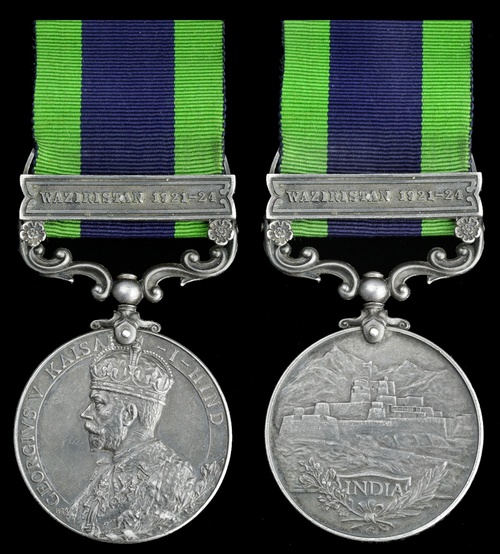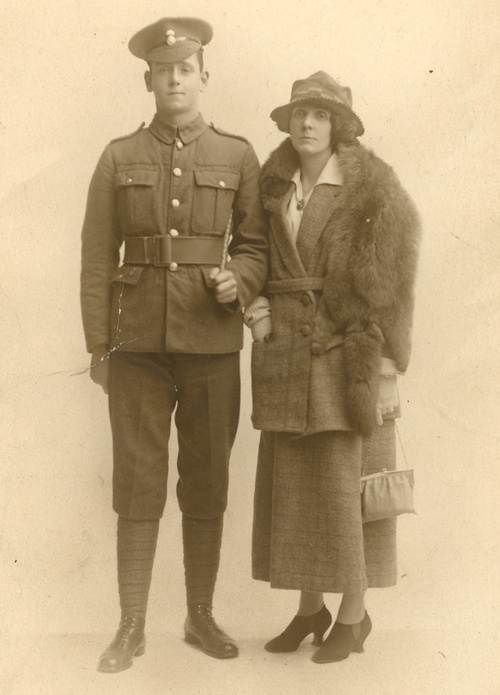Auction: 18002 - Orders, Decorations and Medals
Lot: 153
Family group:
'It was a very brave thing to do, as he must have realised the great risk he ran, as he knew other people had been hit already. He was not ordered to go out and there was absolutely no need for him to go. It was his bravery and desire to help his wounded comrade that made him do it.
There is a very unfair order in the Army that says, if a man is killed he cannot get any decoration except the Victoria Cross, otherwise your son would certainly have received the Military Medal.'
Captain H. Lyle to the mother of Private Murphy on his gallant death.
The poignant India General Service Medal awarded to Fusilier B. P. Murphy, Royal Welch Fusiliers, who was killed in action while attempting to save a wounded comrade in Waziristan
India General Service 1908-35, 1 clasp, Waziristan 1921-24 (2731111 Fsr. B. P. Murphy. R. W. Fus.), very fine
Four: Private F. J. Murphy, King's Liverpool Regiment
British War and Victory Medals 1914-18 (229468 Pte. F. J. Murphy. L'pool R.); Defence and War Medals 1939-45, very fine (5)
Barney P. Murphy, Francis Murphy's younger brother, served on the North-West Frontier of India as a Private in 'A' Company, 1st Battalion, Royal Welch Fusiliers. The battalion sailed for India on 26 November 1921.
The Waziris were the largest frontier tribe, dominating the area between the Tochi and Gomal rivers. The landscape here was so barren that Waziris existed through banditry, robbing travellers and pillaging villages. The most feared Waziri clan were the Mahsuds, who raided the North-West Frontier with impunity before escaping to their mountain hideaways.
On 5 February 1922 the 1st Battalion, Royal Welch Fusiliers were protecting a detachment of Royal Engineers who were constructing a picquet below a feature called Split Hill, near the Tibetan border. A horde of Mahsuds descended on the small British force. The story is taken up by Captain H. Lyle, an officer of 'A' Company, in a letter he wrote to Murphy's mother on 4 October:
'I was commanding a platoon of 'A' Coy. on the 5th February, during the fight in which your son was killed, and I will do my best to tell you all about it.
On the 5th February the whole Battalion was protecting some engineers who were making a picquet. 'A' Coy. was the front company, and had to occupy a long ridge in advance of the other companies. Nos II & IV Platoons were in front, and Nos III & I in reserve behind. As you very likely know, your son was in No. I Platoon.
The two platoons in front were very heavily fired at all day, and about 2 p.m. they retired from the most advanced positions and only held half the ridge. As the Mahsuds were coming closer through the thick under-growth, No. III Platoon was called up to help the other two. This left only your son's platoon in reserve.
By this time it was about 3 p.m. and everything had gone quite well. The picquet had been built and we were expecting to be able to retire back to camp at any minute. But at the last moment a most unfortunate thing happened.
The Company Sergeant-Major was wounded while crossing a very exposed piece of ground. His runner immediately rushed out to try and bring the C.S.M. in, but he got badly wounded himself. Then another man tried to crawl out to them but was wounded twice.
The Mahsuds then started to try and crawl up to the wounded men to get their rifles, and to stop them No. 1 Platoon was brought up to re-inforce the other platoons. As they came up Sgt. Jones who was commanding No. I Platoon asked what had happened. I told him there were wounded men lying out in front and we couldn't get them in. Directly they heard me saying this, your son and another man called Owens took off their equipment and rushed over the top of a ridge.
Directly they appeared over the top of the hill the enemy opened a heavy fire on them, but they managed to reach Company Sergeant-Major Grindely. Owens took him by the shoulders and your son by the legs. As they lifted up the wounded man your son was hit about three times almost at once. He was killed instantly and really couldn't have suffered any pain. Owens managed to get back to cover somehow.
It was a very brave thing to do as he must have realised the great risk he ran, as he knew the other people had been hit already. He was not ordered to go out and there was absolutely no need for him to go. It was his bravery and desire to help his wounded comrades, that made him do it.
For doing the same thing in that fight four men in 'A' Company got the Military Medal for bravery. There is a very unfair order in the Army that says, if a man is killed he cannot get any decoration except the Victoria Cross, otherwise your son would certainly have received the Military Medal.'
Murphy was 18 years old and is buried in the Makin Military Cemetery, Pakistan, besides being commemorated in Wrexham Parish Church.
Francis Murphy was the son of Mrs. Murphy of Longstone, Coombe Hill, East Grinstead, Sussex, England. He served as a Private with 'A' Company, 2/10th (Scottish) Battalion, The King's Liverpool Regiment. Part of 172 Brigade, 57th (2nd West Lancashire) Division, the Battalion arrived in France in February 1917 and fought at Second Arras (9 April - 16 May), the longest advance made by the Allies since trench warfare began. The Battalion sustained heavy casualties during the German Spring Offensive, and was absorbed into the 1/10th on 30 April 1918. Murphy served in the Labour Corps for the remainder of the Great War; sold with copied M.I.C.
Sold with an emotive family archive, including:
(i)
The original handwritten letter from Captain H. Lyle to Mrs. Murphy, dated 4 October 1922.
(ii)
Period photographs of Francis and Barney Murphy alongside their mother.
(iii)
Photographs of Wrexham Parish Church, showing Barney Murphy's name on the brass memorial plaque.
(iv)
A telegram sent to Mrs. Murphy by the Commanding Officer of 1st Battalion, Royal Welch Fusiliers, describing the memorial plaque at Wrexham. Dated 1 April 1924.
Subject to 20% VAT on Buyer’s Premium. For more information please view Terms and Conditions for Buyers.
Sold for
£950







